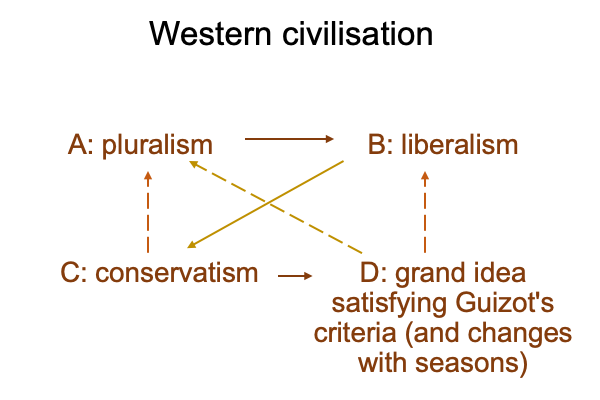0074 Part two of Diesen’s book concerns the rise and fall of political liberalism. Chapter three opens with a discussion of Western civilisation as an amalgam of political liberalism and nationhood.
What is another word for political liberalism?
Does “pluralism” suffice?
0075 In 1828 AD, French politician and historian Francois Guizot publishes A General History of Civilisation in Europe,in which he proposes that the unity and the advancement of civilisation are founded on conformity to a great idea.
Surely, such a great idea goes into slot D in Diesen’s Greimas square.
The fulcrum point is a great idea. The fulcrum point balances on a theme.
0076 What about Western civilization?
Diesen suggests that the idea is pluralism, as defined by a balance between liberalism and conservatism.
But, I don’t think that pluralism is the great idea (D). I think that is is a focal point (A).
Correspondingly, liberalism slides into the slot for gesellschaft (B) and conservatism goes into the slot for gemeinschaft(C)
0077 How so?
Liberals fixate on rational choices. People are rational actors.
Should I correct myself?
Liberals (B) fixate on opportunities that appear to be rational at the time. So do illiberals, such as fascists and communists, as well as (il)liberals, such as American big government (il)liberals (“bigilibs”, for short).
Also, conservatives (C) fixate on apparently irrational, religious and cultural traditions that are familiar to their communities. The conservatives may go so far as to insist that there is an object that brings everyone… oh, more than that… all creation… into relation. God brings all things into relation, including and especially us, because we are the only creatures in the universe who seem to be aware of this ultimate relational being.
0078 So, if pluralism is the focal word (A), then what would be the theme, the great idea (D), that satisfies Guizot’s vision?
Whatever the theme is, it would enter the slot for D.
0079 Here is a picture of Diesen’s Greimas square, at this moment.

0080 According to Diesen, the purpose of chapter three is to explore the rise of Western civilisation (spring and summer) and threats from contemporary dogmas of liberal absolutism, universalism and civic nationalism.
0081 His declaration of intent inspires me to ask, “Who is sovereign?”
The individual is sovereign in liberal absolutism.
A political idea, what Dugin calls an “-sim”, is sovereign in universalism.
A nation-state is sovereign in civic nationalism.
Oh, lest I forget, international corporations are sovereign in globalism.
0082 Ah, I now know what goes into slot D.
